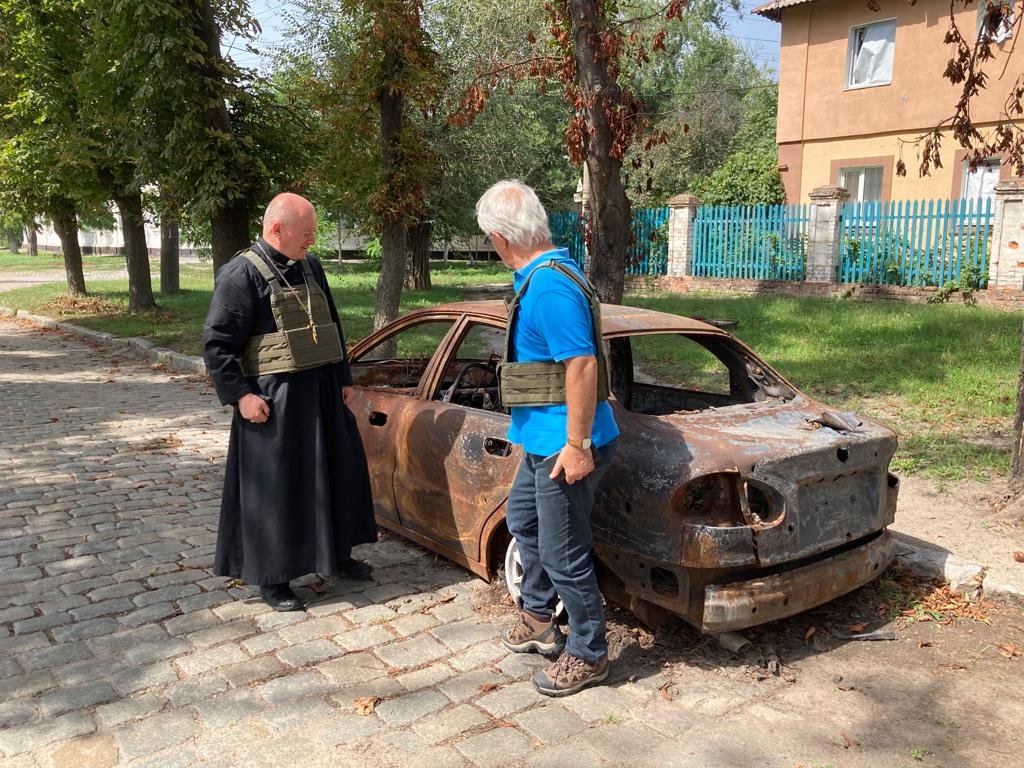Bishop Jan Sobilo got used to missiles flying over his house. Like thousands of people in his diocese, he also has to get used to record low temperatures inside his residence.
"I'm sitting at home in my coat in the freezing cold -- and while some food is available, there's no light or heating," he said.
Auxiliary Bishop Sobilo of Kharkiv-Zaporizhzhia said that despite worsening conditions following Christmas and the start of the new year, the people in war-torn eastern Ukraine are determined to fight on.
Although they are shelled and shot at constantly, with casualties mounting on both sides, "people remain determined to fight on till victory," he said.
The bishop spoke as heavy fighting continued around Bakhmut and Soledar in Ukraine's partly Russian-occupied Donetsk region, with missile and drone attacks reported in multiple towns.
In a Jan. 11 interview with OSV News, he said humanitarian needs had spiraled with the persistent disruption of power and water supplies and as less aid reached eastern areas because of winter conditions.
He added that Catholics were still attending Mass in Zaporizhzhia and other towns, despite transport difficulties and fears fresh Russian troops were being readied for a major new offensive, this time against Kyiv.
"Those most afraid have already left, while those who remain insist they'll continue supporting our troops, whatever form the offensive takes," Bishop Sobilo told OSV News.
"We've welcomed news that heavier and more powerful military equipment could soon reach us from the West. This has raised hopes of eventual victory, especially if it ensures the occupiers won't reach central Ukraine and perhaps continue from there to Western Europe."
On Jan. 11, during his visit to Lviv in western Ukraine, Polish President Andrzej Duda announced that Poland would deliver 14 Leopard tanks to Ukraine as part of a broader international coalition. The move yet has to get international permits and German approval for re-export, because the tanks are German-produced, but the Ukrainian side was pleased by the announcement.
Pope Francis urged Catholics not to "forget about long-suffering Ukraine, which is always in our hearts," during his Jan. 11 Rome general audience. He added that the country's "severe suffering" needed "affection, closeness and prayer."
Meanwhile, the head of the Ukrainian Catholic Church, Major Archbishop Sviatoslav Shevchuk of Kyiv-Halych, confirmed that Christmas had raised hopes for a "victorious new year," as Ukrainians "lived, fought and celebrated the Savior's coming into the world."
However, he added that Russia's tactic had been to shell "places where citizens usually congregate, such as markets," and said Soledar had already been wiped out, leaving "its surroundings covered with mountains of corpses."
"Every inch of this wounded earth is covered, soaked, drenched with human blood -- today, Soledar is a picture of Russian madness as they try to achieve political goals by military means, completely disregarding the lives and dignity of their soldiers," Archbishop Shevchuk said in a Jan. 10 national message.
Addressing Ukrainians Jan. 9, President Volodymyr Zelenskyy insisted his forces were holding their ground, as the European Union prepared a 10th package of sanctions against Moscow.
Meanwhile, the Ukrainian government continued moves against Orthodox communities that claim loyalty to Russia's Moscow Patriarchate. Legislation passing through Ukrainian’s parliament in Kyiv would ban churches affiliated with Moscow, which Zelenskyy said is necessary to keep Moscow from weakening Ukraine "from within."
Ukrainian media said the citizenship of two bishops and 11 other clergy had been suspended after recent police raids on Moscow-linked Orthodox properties, while Orthodox Metropolitan Varsonofy (Stoliar) of Vinnitsa-Bar faced up to eight years in prison for "publicly justifying Russian armed aggression."
In his interview with OSV News, Bishop Sobilo said he remained in close contact with Catholic priests and parishioners across the Kharkiv-Zaporizhzhia Diocese, and he observed how the war had forged closer links among Christians of all denominations.
"Many Orthodox resent the position adopted by their own church, and are shocked its leader has supported the war and engaged politically with it," the bishop said.
"But the main interest of Catholics is for Orthodox Christians to find ways of living peacefully together, in a spiritual sphere freed from politics," he said. "Many are already looking at their situation differently, and we hope this opens up a new sphere of dialogue and common life among Catholics and Orthodox across the Ukrainian lands."
Addressing diplomats accredited to the Holy See, the pope said Jan. 9 that the conflict in Ukraine, "with its wake of death and destruction," offered "the closest and most recent example" of how a "third world war" was now taking place "in a globalized world."
He added that attacks on Ukraine's civilian infrastructure had caused deaths "not only from gunfire and acts of violence, but also from hunger and freezing cold," and said church teaching viewed the "indiscriminate destruction of whole cities" as "a crime against God and humanity."
"Today, I feel bound to renew my appeal for an immediate end to this senseless conflict, whose effects are felt in entire regions, also outside of Europe, due to its repercussions in the areas of energy and food production," the pontiff told diplomats.
"We are very grateful to the Holy Father for his closeness," Archbishop Mieczyslaw Mokrzycki, the Latin-rite archbishop of Lviv, told OSV News. The closeness, he stressed, is shown not only by words, but also by special envoys such as Cardinal Konrad Krajewski, head of the Dicastery for the Service of Charity, who has already visited the war-torn country several times.
The church, Archbishop Mokrzycki said, distributes humanitarian help but above all is there "with sacraments and with support to the suffering nation – thanks to our prayers and our presence in the society, people do not lose hope."

